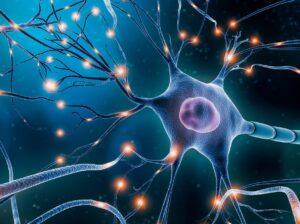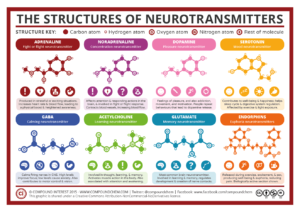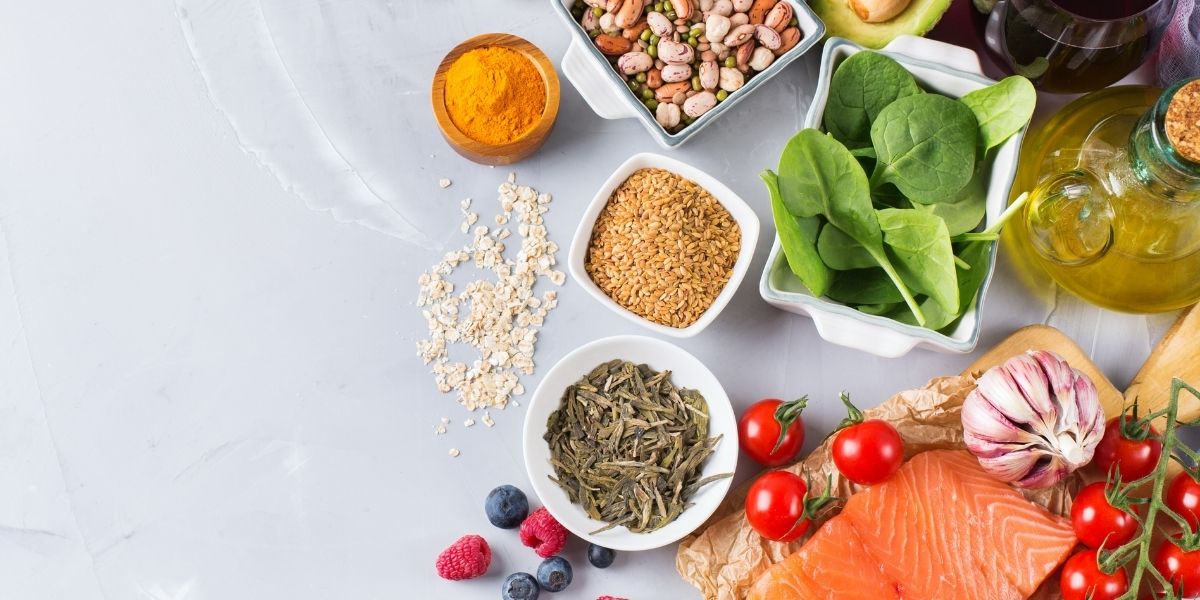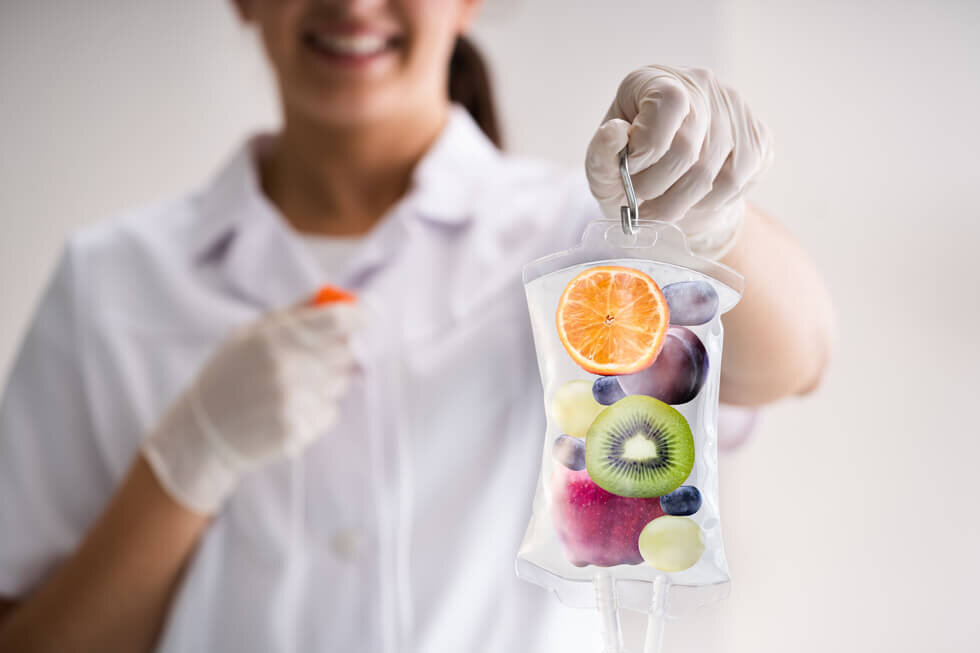Our brains are in constant communication with our guts. That constant communication on the macro level flows through three currents : The physical, the physiological and the psychological.
On the micro level, those three currents are constantly communicating through neurons, neurotransmitters and microbes. Overall, this three-tunneled connection is known as The Gut-Brain Axis.
The Gut-brain Axis and Neurons
Neurons are nerve cells found in your brain and central nervous system. Nerves are like cables that carry electrical impulses between our brains and the rest of our bodies (in this case the gut). These impulses help us feel sensations and move our muscles. They also maintain certain functions like breathing, sweating or digesting food. There are approximately 100 billion neurons in the human brain.
Our brains communicate with all of our body through those nerves making The Nervous System. Fascinatingly, more information passes between our brains and our guts than any other body system through mainly The Vagus Nerve. In fact, there are 500 million nerve cells in our guts more than anywhere else in our body outside of your brain.
Animal studies have found that stress slows down the signals sent through the vagus nerve and also causes gastrointestinal problems.
Similarly, one study in humans found that people with gastrointestinal diseases like irritable bowel syndrome (IBS) and Crohn’s disease had reduced vagal tone, indicating a reduced function of the vagus nerve.

The Gut-brain Axis and Neurotransmitters
Our guts and brains are also connected through chemicals called neurotransmitters. Those chemicals allow neurons to communicate with each other throughout the body. They enable the brain to provide a variety of functions, through the process of chemical synaptic transmission. These chemicals channeled in the neurons are integral in shaping everyday life and functions for every human being.
Neurotransmitters produced in the brain control feelings and emotions. Approximately 95% of total body serotonin is provided in the gut. Serotonin is one of the leading “Happiness” hormones and it also controls overall moods,sleep, digestion, nausea, wound healing, bone health, blood clotting and sexual desire. This is why for instance, when someone is diagnosed with depression, they are referred to as “chemically imbalanced or insufficient”.
Many other neurotransmitters are also produced by our gut cells like (GABA) which helps control anxiety and fear. The enteric nervous system uses more than 30 neurotransmitters, just like the brain. This is where the term “Second Brain” came from which refers to the gut.

The Gut-brain Axis and Microbes
Trillions of microbes, viruses and fungi called Microbiota collectively live in the Microbiome in the gut. Fascinatingly, the microbiota make other chemicals, affecting further how our brains work too.
Our gut microbiota produce lots of short-chain fatty acids (SCFA) such as butyrate, propionate and acetate. They make SCFA by digesting fiber. SCFA affects brain function in a number of ways, such as reducing appetite. Another SCFA, butyrate, and the microbes that produce it are also important for forming the barrier between the brain and the blood, which is called the blood-brain barrier.
Additionally, gut microbiota metabolize bile acids and amino acids to produce other chemicals that affect the brain. Bile acids are chemicals made by the liver that are normally involved in absorbing dietary fats. However, they may also affect the brain.
Two studies in mice found that stress and social disorders reduce the production of bile acids by gut bacteria and alter the genes involved in their production.
Furthermore, Gut and gut microbiota play an important role in your immune system and inflammation by controlling what is passed into the body and what is excreted. If our immune systems are switched on for too long, it can lead to inflammation.
Inflammation and high LPS in the blood have been associated with a number of brain disorders including severe depression, and dementia.

Deeper scientific studies showing the link between mental health and gut health
A study from the University of Oxford has linked specific gut microbes to personality traits and emotional states.
Other mental health studies, showed that patients with inflammatory gastrointestinal disorders such as (Irritable Bowel Syndrome, Inflammatory Bowel Disease…etc) are more likely to experience depression. Episodes of depressive symptoms are possibly related to disrupting the pathways involved in the gut–brain axis. Persistent neuroinflammation alters brain functioning and affects a person’s mood and behavior. People with depression who resist medical treatment might have severe inflammation and gut dysbiosis. Preliminary evidence from additional observational studies has demonstrated that patients with depression and anxiety disorders have significantly different gut microbiome profiles compared to healthy individuals.
Emphasizing and elaborating further, other research used rodent models only to find out that the blood-brain barrier (BBB) became more penetrable when the normal intestinal microbiota (healthy bacteria,viruses and fungi that live in the microbiome) was lost or disturbed. It has been discovered that microbial dysbiosis affects the protective properties of the BBB, including penetrable change causing behavioral alterations.

Foods that generate good gut health and facilitate the Gut-brain Axis (Gut-Friendly Foods)
1.Omega-3 fats: These fats are found in oily fish and also in high quantities in the human brain. Studies in humans and animals show that omega-3s can increase good bacteria in the gut and reduce risk of brain disorders.
2.Fermented foods: Yogurt, kefir, sauerkraut and cheese all contain healthy microbes such as lactic acid bacteria. Fermented foods have been shown to alter brain activity.
3.High-fiber foods: Whole grains, nuts, seeds, fruits and vegetables all contain prebiotic fibers that are good for your gut bacteria. Prebiotics can reduce stress hormones in humans.
4.Polyphenol-rich foods: Cocoa, green tea, olive oil and coffee all contain polyphenols, which are plant chemicals that are digested by your gut bacteria. Polyphenols increase healthy gut bacteria and may improve cognition.
5.Tryptophan-rich foods: Tryptophan is an amino acid that is converted into the neurotransmitter serotonin. Foods that are high in tryptophan include turkey, eggs and cheese.
6.Probiotics and Prebiotics supplements and foods: Another interesting study in mice found that feeding them a probiotic reduced the amount of stress hormone in their blood. However, when their vagus nerve was cut, the probiotic had no effect. As mentioned above, the vagus nerve is important in the gut-brain axis and its role in stress. Other studies in mice have shown that certain probiotics can increase the production of GABA (the neurotransmitter that controls fear and anxiety) ultimately reducing anxiety and depression-like behavior.
Foods to avoid to facilitate your gut-brain axis
- Processed foods
- Harmful additives
- Sweeteners
- Saturated fats
The collective complications caused by poor gut health
- Digestion difficulty
- Gastrointestinal diseases (such as Irritable Bowel Syndrome)
- Malfunctioning metabolism.
- Mood disorders ( depression and anxiety)
- Behavior changes
- Increased stress
- Pain sensitivity
- Poor cognitive function.
- Weakened immunity
- Hunger or poor appetite
- Altered food preferences and cravings.
- Food sensitivities and intolerances.
- Stiff gut motility (rigid gastrointestinal muscle movements causing constipation)
What are the main gastrointestinal diseases ?
- Ulcerative colitis
- Celiac disease
- Irritable bowel syndrome
- Peptic ulcer
- Gastritis
- Gastroenteritis
- Gastroesophageal
- Dyspepsia
- Gastrointestinal cancer
Eating gut-friendly foods and treating diagnosed gastrointestinal diseases should facilitate the key functions of the gut-brain axis and ultimately mental and physical wellness.



